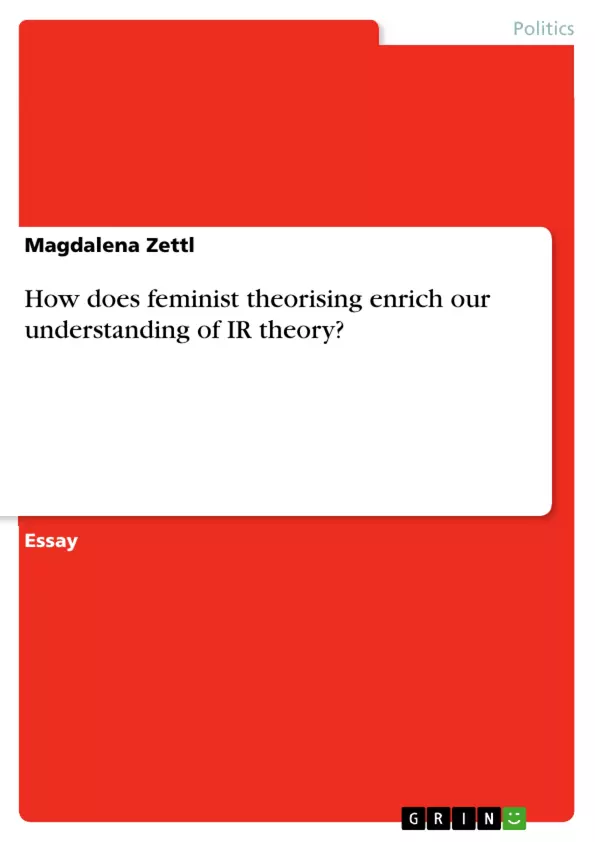Realism and liberalism have long been the dominant theories within IR. However, these failed to give a full-fledge explanation about the peaceful end of the Cold War, thereby giving way to more alternative IR views, such as Feminism. The increased use of violence against women as a weapon of war1, sexual trafficking, military prostitution2 as well as women's increasingly important role as peace activists and wives of statesmen (Baylis & Smith, 1997: 174) prove that women do influence politics. This lets Feminist scholars, such as C. Enloe, pose the legitimate question "Where were the women in world politics" (1990, p. 133). The establishment of the International Feminist Journal of Politics in 1999 (Taylor & Francis Online, 2012) and the UN Resolution 1325 "Women, Peace and Security" in 2000 (Women for Peace, 2012) seem to prove that Feminism has finally been granted a place in IR. Nevertheless, the relatively low number and the rather aggressive, male-like behaviour of female political actors3 let us question this presumption.
After outlining the main strands and concepts of Feminist Theory, the essay highlights feminist critique on traditional IR theory4. I, then, explain how Feminism allows for a re-evaluation and expansion of basic IR concepts, thereby enriching IR theory.
Inhaltsverzeichnis (Table of Contents)
- Introduction
- Feminist Theory
- Liberal Feminism
- Postmodern Feminism
- Standpoint Feminism
- Feminist Critique on Traditional IR Theory
- Realism
- Liberalism
- Re-evaluation of Basic IR Concepts
- Power
- State
- Security
- Peace and War
- Conclusion
Zielsetzung und Themenschwerpunkte (Objectives and Key Themes)
This essay aims to explore how feminist theorizing enhances our comprehension of IR theory. It analyzes the feminist critique of traditional IR theory, particularly realism and liberalism, and examines how feminist concepts re-evaluate and expand key IR concepts like power, the state, security, peace, and war.- Feminist critique of traditional IR theory
- Re-evaluation of key IR concepts through a feminist lens
- The potential for collaboration between feminist standpoint theory and neoliberal institutionalism
- The impact of gendered assumptions on IR theory
- The role of women in international politics and the need for their inclusion
Zusammenfassung der Kapitel (Chapter Summaries)
- Introduction: This section introduces the essay's objective, which is to analyze the contributions of feminist theorizing to IR theory. It highlights the limitations of traditional IR theories, realism and liberalism, and the growing relevance of feminist perspectives in the field.
- Feminist Theory: This chapter outlines the main strands of feminist theory, including liberal, postmodern, and standpoint feminism. It emphasizes the focus of these strands on the disadvantages and discrimination faced by women in global politics.
- Feminist Critique on Traditional IR Theory: This section explores the feminist critique of both realism and liberalism. It argues that these traditional theories are inherently gendered, with underlying assumptions prioritizing male values and excluding women from the political sphere. The critique focuses on the exclusion of women from power structures and the perpetuation of a gendered discourse in international relations.
- Re-evaluation of Basic IR Concepts: This chapter analyzes how feminist scholars re-evaluate and expand basic IR concepts such as power, the state, security, peace, and war. It argues that a feminist lens reveals the limitations of traditional definitions and offers alternative perspectives that emphasize cooperation, inclusion, and the interconnectedness of national and international politics.
Schlüsselwörter (Keywords)
This essay focuses on feminist theory, international relations theory, gender, power, the state, security, peace, war, realism, liberalism, and the intersection of these concepts within the framework of a feminist perspective. Key figures like Tickner, Morgenthau, and Elshtain are also explored, highlighting their contributions to feminist scholarship in international relations.Frequently Asked Questions
How does Feminism enrich International Relations (IR) theory?
Feminism challenges the male-centric assumptions of traditional IR, introducing gender as a key analytical category and expanding concepts like security, power, and the state.
What is the feminist critique of Realism?
Feminists argue that Realism's focus on "rational man" and state sovereignty reflects male experiences of autonomy and competition, ignoring domestic spheres and the roles of women.
How do feminists redefine "Security"?
Instead of just military defense of borders, feminists view security holistically, including protection from domestic violence, economic insecurity, and environmental threats.
What is Standpoint Feminism?
Standpoint feminism suggests that knowledge is socially situated and that marginalized groups (like women) have a more comprehensive view of power structures than those at the top.
Why is UN Resolution 1325 significant?
UN Resolution 1325 on "Women, Peace, and Security" formally recognizes the disproportionate impact of war on women and the importance of their participation in peace processes.
- Citar trabajo
- Magdalena Zettl (Autor), 2012, How does feminist theorising enrich our understanding of IR theory?, Múnich, GRIN Verlag, https://www.grin.com/document/266408



